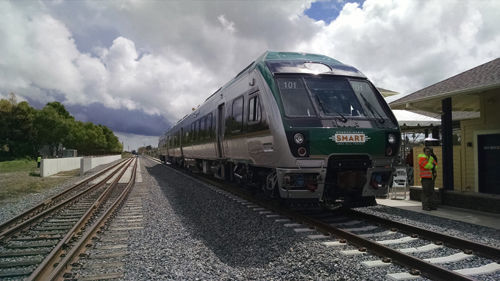The Sonoma Marin Area Rail Transit (SMART) Board of Directors has spent the past month going on a listening tour of areas along the train’s current or projected path. Last week, Cloverdale had an opportunity to participate in a listening session.
Thus far, the board has had sessions in Santa Rosa, Windsor and Healdsburg as well.
“I know that there is a tremendous amount of interest and we want to inform you about what our expectations are, what our needs are and we also want to hear some updates from you,” Councilmember Melanie Bagby said at the start of the meeting.
The question of the night is one that’s been swirling around down since the train’s inception — can Cloverdalians expect to see the SMART train come to Cloverdale, and what needs to be done to help get it there.
“What do we need to do to better communicate our plans, our potential for development that exists within our urban growth boundary? What is it that we need to do to better communicate with the SMART board and other municipalities to answer the concerns I think, rightfully so, about our population levels being worth the financial investment in coming all the way to Cloverdale?” posed Bagby, a longtime advocate for the train who also sits on the board of the Sonoma County Transit Authority.
In response, Sonoma County District 2 Supervisor and SMART board member David Rabbitt said that federal and state money for transportation is harder and harder to come by, especially as discussions about transportation become more partisan.
“Because the dollars have become so scarce, I think it’s also the cost-benefit factors that have come into play and everything is competitive,” Rabbit said. “We have a lot of things to make sure that we can communicate when we’re trying to make the best case of why we can continue going north — including that cost-benefit analysis and what it can bring to the communities of Cloverdale … it’s challenging.”
One action proposed by board member Debora Fudge is having the city contact Lake and Mendocino counties to determine how many people from those counties may use the train to head south.
“It isn’t just about Cloverdale, it’s about Lake and Mendocino counties as well,” Fudge said.
Bagby said that she thinks the city has that information in-house, but that she would look to the county and the SMART board to reach out to those counties on Cloverdale’s behalf, especially considering the city’s limited resources and staffing capacity.
One of the barriers to getting the train to Cloverdale is first getting the train to Healdsburg. When it comes to getting the train over the river in Healdsburg, SMART General Manager Farhad Mansourian said that they have money from the SMART extension to Windsor to conduct an analysis about going further north.
One of the analyses that has been done is how to cross the river in Healdsburg in a more economical way, Mansourian said, noting that they have reduced the cost of the bridge substantially and “in the very near future we’ll be coming out with the components of what it takes to go to Healdsburg.”
Cloverdale resident Renee Roe said that she purchased her home in Cloverdale in the hopes that the train would come to town.
“One of the selling points was the SMART train and from what I’m hearing from other citizens who are paying property taxes, we feel like there’s very little hope that we’ll ever see in our lifetime the SMART train come to Cloverdale, so it’s hard for us to get behind additional taxes if we’re not going to benefit. I do strongly feel that Cloverdale can benefit, we’ll see more people move to Cloverdale as well as more tourism if we bring the train to Cloverdale,” Roe said.
“That’s the part that’s still unclear to me,” Roe said during a later part of the meeting. “I was looking at the sales tax that didn’t pass, so what else is needed? I’m not a transportation person, but is it grant writing? Is it how do we look for the funding? What can the city do? The city council, the mayor and what can the residents do to help? It seems like we need to have a plan for the city of Cloverdale, instead of just continuing to wish it would come.”
Rabbitt said that those who want to see the train in Cloverdale should voice support for the train and its associated measures, and that the council should write letters backing SMART measures and plans, and voice support at the state and federal levels when the rail service seeks federal and state funding.
Cloverdale does present a challenge, however, he noted, since the cost-benefit analysis involves the high cost of getting the train to town but doesn’t promise high rider numbers, due to the size of the city.
“We continue to work on that. We continue to advocate … to drive home that point that this is a very important project and make sure that it’s included. We look at trying to include it in several different ways,” he said.
Cloverdale resident Gene Marcinkowski, who takes the SMART train south for volunteer work, asked if SMART’s proposed freight line would help SMART’s bottom line. Rabbitt said that it likely would, and that freight could only help.
SMART’s Measure I on the March 2020 ballot, which would’ve helped sustain the train using an extended ⅔ cent sales tax but didn’t guarantee further movement north, failed to gain traction with voters. The measure needed to have a 66% ‘yes’ vote and only received 52.34%. Locally, precincts in Cloverdale reported 50-53% ‘no’ votes for the measure. Areas predominantly voting yes on the measure included Healdsburg, central Santa Rosa, Petaluma and areas outside of the train’s path, like west county and Sonoma.
Another suggestion brought up during the meeting included thinking about marketing the city as a destination that people could take the train to, rather than a city that would be using the train for primarily commuter purposes for people heading south.
To view a video of the listening session, click here.









